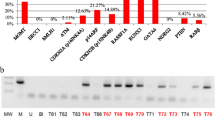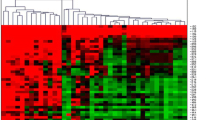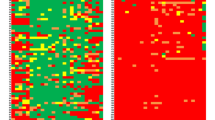Abstract
MGMT (O 6-methylguanine-DNA methyltransferase) promoter hypermethylation is a helpful prognostic marker for chemotherapy of gliomas, although with some controversy for low-grade tumors. The objective of this study was to retrospectively investigate MGMT promoter hypermethylation status for a series of 350 human brain tumors, including 275 gliomas of different malignancy grade, 21 glioblastoma multiforme (GBM) cell lines, and 75 non-glial tumors. The analysis was performed by methylation-specific PCR and capillary electrophoresis. MGMT expression at the protein level was also evaluated by both immunohistochemistry (IHC) and western blotting analysis. Associations of MGMT hypermethylation with IDH1/IDH2 mutations, EGFR amplification, TP53 mutations, and 1p/19q co-deletion, and the prognostic significance of these, were investigated for the gliomas. MGMT promoter hypermethylation was identified in 37.8% of gliomas, but was not present in non-glial tumors, with the exception of one primitive neuroectodermal tumor (PNET). The frequency was similar for all the astrocytic gliomas, with no correlation with histological grade. Significantly higher values were obtained for oligodendrogliomas. MGMT promoter hypermethylation was significantly associated with IDH1/IDH2 mutations (P = 0.0207) in grade II–III tumors, whereas it had a borderline association with 1p deletion (P = 0.0538) in oligodendrogliomas. No other association was found. Significant correlation of MGMT hypermethylation with MGMT protein expression was identified by IHC in GBMs and oligodendrogliomas (P = 0.0001), but not by western blotting. A positive correlation between MGMT protein expression, as detected by either IHC or western blotting, was also observed. The latter was consistent with MGMT promoter hypermethylation status in GBM cell lines. In low-grade gliomas, MGMT hypermethylation, but not MGMT protein expression, was associated with a trend, only, toward better survival, in contrast with GBMs, for which it had favorable prognostic significance.




Similar content being viewed by others
References
Kaina B, Christmann M, Naumann S et al (2007) MGMT: key node in the battle against genotoxicity, carcinogenicity and apoptosis induced by alkylating agents. DNA Repair (Amst) 6:1079–1099
Esteller M, Hamilton SR, Burger PC, Baylin SB, Herman JG (1999) Inactivation of the DNA repair gene O 6-methylguanine-DNA methyltransferase by promoter hypermethylation is a common event in primary human neoplasia. Cancer Res 59:793–797
Hegi ME, Diserens AC, Godard S et al (2004) Clinical trial substantiates the predictive value of O 6-methylguanine-DNA methyltransferase promoter methylation in glioblastoma patients treated with temozolomide. Clin Cancer Res 10:1871–1874
Hegi ME, Diserens AC, Gorlia T et al (2005) MGMT gene silencing and benefit from temozolomide in glioblastoma. N Engl J Med 352:997–1003
Mellai M, Caldera V, Annovazzi L et al (2009) MGMT promoter hypermethylation in a series of 104 glioblastomas. Cancer Genomics Proteomics 6:219–227
Jha P, Suri V, Jain A et al (2010) O 6-methylguanine DNA methyltransferase gene promoter methylation status in gliomas and its correlation with other molecular alterations: first Indian report with review of challenges for use in customized treatment. Neurosurgery 67:1681–1691
Suri V, Jha P, Sharma MC, Sarkar C (2011) O 6-methylguanine DNA methyltransferase gene promoter methylation in high-grade gliomas: a review of current status. Neurol India 59:229–235
Kang SH, Park KJ, Kim CY et al (2011) O 6-methylguanine DNA methyltransferase status determined by promoter methylation and immunohistochemistry in gliosarcoma and their clinical implications. J Neurooncol 101:477–486
Das P, Puri T, Jha P et al (2011) A clinicopathological and molecular analysis of glioblastoma multiforme with long-term survival. J Clin Neurosci 18:66–70
Olson RA, Brastianos PK, Palma DA (2011) Prognostic and predictive value of epigenetic silencing of MGMT in patients with high grade gliomas: a systematic review and meta-analysis. J Neurooncol 105:325–335
Watanabe T, Nakamura M, Kros JM et al (2002) Phenotype versus genotype correlation in oligodendrogliomas and low-grade diffuse astrocytomas. Acta Neuropathol 103:267–275
Komine C, Watanabe T, Katayama Y, Yoshino A, Yokoyama T, Fukushima T (2003) Promoter hypermethylation of the DNA repair gene O 6-methylguanine-DNA methyltransferase is an independent predictor of shortened progression-free survival in patients with low-grade diffuse astrocytomas. Brain Pathol 13:176–184
Everhard S, Kaloshi G, Crinière E et al (2006) MGMT methylation: a marker of response to temozolomide in low-grade gliomas. Ann Neurol 60:740–743
Watanabe T, Katayama Y, Yoshino A et al (2007) Aberrant hypermethylation of p14ARF and O 6-methylguanine-DNA methyltransferase genes in astrocytoma progression. Brain Pathol 17:5–10
Bello MJ, Alonso ME, Amiñoso C et al (2004) Hypermethylation of the DNA repair gene MGMT: association with TP53 G:C to A:T transitions in a series of 469 nervous system tumors. Mutat Res 554:23–32
Watanabe T, Katayama Y, Komine C et al (2005) O 6-methylguanine-DNA methyltransferase methylation and TP53 mutation in malignant astrocytomas and their relationships with clinical course. Int J Cancer 113:581–587
Groenendijk FH, Taal W, Dubbink HJ et al (2011) MGMT promoter hypermethylation is a frequent, early, and consistent event in astrocytoma progression, and not correlated with TP53 mutation. J Neurooncol 101:405–417
Möllemann M, Wolter M, Felsberg J, Collins VP, Reifenberger G (2005) Frequent promoter hypermethylation and low expression of the MGMT gene in oligodendroglial tumors. Int J Cancer 113:379–385
Brandes AA, Tosoni A, Cavallo G et al (2006) Correlations between O 6-methylguanine DNA methyltransferase promoter methylation status, 1p and 19q deletions, and response to temozolomide in anaplastic and recurrent oligodendroglioma: a prospective GICNO study. J Clin Oncol 24:4746–4753
Levin N, Lavon I, Zelikovitsh B et al (2006) Progressive low-grade oligodendrogliomas: response to temozolomide and correlation between genetic profile and O 6-methylguanine DNA methyltransferase protein expression. Cancer 106:1759–1765
Tosoni A, Franceschi E, Ermani M et al (2008) Temozolomide three weeks on and one week off as first line therapy for patients with recurrent or progressive low grade gliomas. J Neurooncol 89:179–185
Kesari S, Schiff D, Drappatz J et al (2009) Phase II study of protracted daily temozolomide for low-grade gliomas in adults. Clin Cancer Res 15:330–337
van den Bent MJ, Dubbink HJ, Sanson M et al (2009) MGMT promoter methylation is prognostic but not predictive for outcome to adjuvant PCV chemotherapy in anaplastic oligodendroglial tumors: a report from EORTC Brain Tumor Group Study 26951. J Clin Oncol 27:5881–5886
Wick W, Hartmann C, Engel C et al (2009) NOA-04 randomized phase III trial of sequential radiochemotherapy of anaplastic glioma with procarbazine, lomustine, and vincristine or temozolomide. J Clin Oncol 27:5874–5880
Kaloshi G, Benouaich-Amiel A, Diakite F et al (2007) Temozolomide for low-grade gliomas: predictive impact of 1p/19q loss on response and outcome. Neurology 68:1831–1836
Ochsenbein AF, Schubert AD, Vassella E, Mariani L (2011) Quantitative analysis of O 6-methylguanine DNA methyltransferase (MGMT) promoter methylation in patients with low-grade gliomas. J Neurooncol 103:343–351
de Robles P, McIntyre J, Kalra S et al (2008) Methylation status of MGMT gene promoter in meningiomas. Cancer Genet Cytogenet 187:25–27
Brokinkel B, Fischer BR, Peetz-Dienhart S et al (2010) MGMT promoter methylation status in anaplastic meningiomas. J Neurooncol 100:489–490
Buccoliero AM, Castiglione F, Rossi Degl’Innocenti D et al (2008) O 6-Methylguanine-DNA-methyltransferase in recurring anaplastic ependymomas: PCR and immunohistochemistry. J Chemother 20:263–268
Faoro D, von Bueren AO, Shalaby T et al (2011) Expression of O(6)-methylguanine-DNA methyltransferase in childhood medulloblastoma. J Neurooncol 103:59–69
Oh J, Bilbao JM, Tsao MN et al (2009) Recurrent PNET with MGMT methylation responds to temozolomide. Can J Neurol Sci 36:654–657
Louis DN, Ohgaki H, Wiestler OD et al (2007) WHO classification of tumors of the central nervous systems, 4th edn. International Agency for Research on Cancer (IARC), Lyon
Waha A, Rollbrocker B, Wiestler OD, von Deimling A (1996) A polymerase chain reaction-based assay for the rapid detection of gene amplification in human tumors. Diagn Mol Pathol 5:147–150
Mellai M, Piazzi A, Caldera V et al (2011) IDH1 and IDH2 mutations, immunohistochemistry and associations in a series of brain tumors. J Neurooncol 105:345–357
Weller M, Berger H, Hartmann C et al (2007) Combined 1p/19q loss in oligodendroglial tumors: predictive or prognostic biomarker? Clin Cancer Res 13:6933–6937
Caldera V, Mellai M, Annovazzi L, Piazzi A, Cassoni P, Schiffer D (2011) Antigenic and genotypic similarity between primary glioblastomas and their derived neurospheres. J Oncol 2011:314962
Ohgaki H, Kleihues P (2007) Genetic pathways to primary and secondary glioblastoma. Am J Pathol 170:1445–1453
van den Bent MJ, Dubbink HJ, Marie Y et al (2010) IDH1 and IDH2 mutations are prognostic but not predictive for outcome in anaplastic oligodendroglial tumors: a report of the European Organization for Research and Treatment of Cancer Brain Tumor Group. Clin Cancer Res 16:1597–1604
Sciuscio D, Diserens AC, van Dommelen K et al (2011) Extent and patterns of MGMT promoter methylation in glioblastoma- and respective glioblastoma-derived spheres. Clin Cancer Res 17:255–266
Preusser M, Janzer RC, Felsberg J et al (2008) Anti-O 6-methylguanine-methyltransferase (MGMT) immunohistochemistry in glioblastoma multiforme: observer variability and lack of association with patient survival impede its use as clinical biomarker. Brain Pathol 18:520–532
Riemenschneider MJ, Jeuken JW, Wesseling P, Reifenberger G (2010) Molecular diagnostics of gliomas: state of the art. Acta Neuropathol 120:567–584
Preusser M, Elezi L, Hainfellner JA (2008) Reliability and reproducibility of PCR-based testing of O 6-methylguanine-DNA methyltransferase gene (MGMT) promoter methylation status in formalin-fixed and paraffin-embedded neurosurgical biopsy specimens. Clin Neuropathol 27:388–390
Esteller M (2002) CpG island hypermethylation and tumor suppressor genes: a booming present, a brighter future. Oncogene 21:5427–5440
Karayan-Tapon L, Quillien V, Guilhot J et al (2010) Prognostic value of O 6-methylguanine-DNA methyltransferase status in glioblastoma patients, assessed by five different methods. J Neurooncol 97:311–322
Grasbon-Frodl EM, Kreth FW, Ruiter M (2007) Intratumoral homogeneity of MGMT promoter hypermethylation as demonstrated in serial stereotactic specimens from anaplastic astrocytomas and glioblastomas. Int J Cancer 121:2458–2464
Brell M, Tortosa A, Verger E et al (2005) Prognostic significance of O 6-methylguanine-DNA methyltransferase determined by promoter hypermethylation and immunohistochemical expression in anaplastic gliomas. Clin Cancer Res 11:5167–5174
Stupp R, Dietrich PY, Ostermann Kraljevic S et al (2002) Promising survival for patients with newly diagnosed glioblastoma multiforme treated with concomitant radiation plus temozolomide followed by adjuvant temozolomide. J Clin Oncol 20:1375–1382
Idbaih A, Omuro A, Ducray F, Hoang-Xuan K (2007) Molecular genetic markers as predictors of response to chemotherapy in gliomas. Curr Opin Oncol 19:606–611
Jeuken JW, Cornelissen SJ, Vriezen M et al (2007) MS-MLPA: an attractive alternative laboratory assay for robust, reliable, and semiquantitative detection of MGMT promoter hypermethylation in gliomas. Lab Invest 87:1055–1065
Brell M, Ibáñez J, Tortosa A (2011) O 6-Methylguanine-DNA methyltransferase protein expression by immunohistochemistry in brain and non-brain systemic tumours: systematic review and meta-analysis of correlation with methylation-specific polymerase chain reaction. BMC Cancer 11:35
Everhard S, Tost J, El Abdalaoui H et al (2009) Identification of regions correlating MGMT promoter methylation and gene expression in glioblastomas. Neuro Oncol 11:348–356
Capper D, Mittelbronn M, Meyermann R, Schittenhelm J (2008) Pitfalls in the assessment of MGMT expression and in its correlation with survival in diffuse astrocytomas: proposal of a feasible immunohistochemical approach. Acta Neuropathol 115:249–259
Sanson M, Marie Y, Paris S et al (2009) Isocitrate dehydrogenase 1 codon 132 mutation is an important prognostic biomarker in gliomas. J Clin Oncol 27:4150–4154
Weller M, Felsberg J, Hartmann C et al (2009) Molecular predictors of progression-free and overall survival in patients with newly diagnosed glioblastoma: a prospective translational study of the German Glioma Network. J Clin Oncol 27:5743–5750
Idbaih A, Marie Y, Pierron G et al (2005) Two types of chromosome 1p losses with opposite significance in gliomas. Ann Neurol 58:483–487
Vogazianou AP, Chan R, Bäcklund LM et al (2010) Distinct patterns of 1p and 19q alterations identify subtypes of human gliomas that have different prognoses. Neuro Oncol 12:664–678
Idbaih A, Kouwenhoven M, Jeuken J et al (2008) Chromosome 1p loss evaluation in anaplastic oligodendrogliomas. Neuropathology 28:440–443
Snuderl M, Eichler AF, Ligon KL et al (2009) Polysomy for chromosomes 1 and 19 predicts earlier recurrence in anaplastic oligodendrogliomas with concurrent 1p/19q loss. Clin Cancer Res 15:6430–6437
Lotfi M, Afsharnezhad S, Raziee HR et al (2011) Immunohistochemical assessment of MGMT expression and p53 mutation in glioblastoma multiforme. Tumori 97:104–108
Watanabe T, Nobusawa S, Kleihues P, Ohgaki H (2009) IDH1 mutations are early events in the development of astrocytomas and oligodendrogliomas. Am J Pathol 174:1149–1153
Yan H, Bigner DD, Velculescu V, Parsons DW (2009) Mutant metabolic enzymes are at the origin of gliomas. Cancer Res 69:9157–9159
Martinez R, Martin-Subero JI, Rohde V et al (2009) A microarray-based DNA methylation study of glioblastoma multiforme. Epigenetics 4:255–264
Noushmehr H, Weisenberger DJ, Diefes K et al (2010) Identification of a CpG island methylator phenotype that defines a distinct subgroup of glioma. Cancer Cell 17:510–522
Huse JT, Phillips HS, Brennan CW (2011) Molecular subclassification of diffuse gliomas: seeing order in the chaos. Glia 59:1190–1199
Phillips HS, Kharbanda S, Chen R et al (2006) Molecular subclasses of high-grade glioma predict prognosis, delineate a pattern of disease progression, and resemble stages in neurogenesis. Cancer Cell 9:157–173
Laffaire J, Everhard S, Idbaih A et al (2011) Methylation profiling identifies 2 groups of gliomas according to their tumorigenesis. Neuro Oncol 13:84–98
Acknowledgments
This work was supported by a Grant from Compagnia di San Paolo, Turin. We are greatly indebted to Dr Bianca Pollo (Fondazione I.R.C.C.S. Istituto Neurologico C. Besta, Milan, Italy) for providing sGBMs.
Author information
Authors and Affiliations
Corresponding author
Rights and permissions
About this article
Cite this article
Mellai, M., Monzeglio, O., Piazzi, A. et al. MGMT promoter hypermethylation and its associations with genetic alterations in a series of 350 brain tumors. J Neurooncol 107, 617–631 (2012). https://doi.org/10.1007/s11060-011-0787-y
Received:
Accepted:
Published:
Issue Date:
DOI: https://doi.org/10.1007/s11060-011-0787-y




